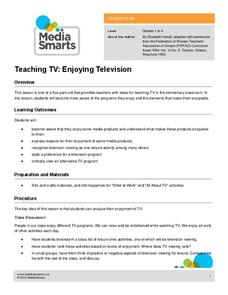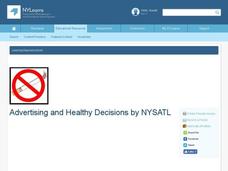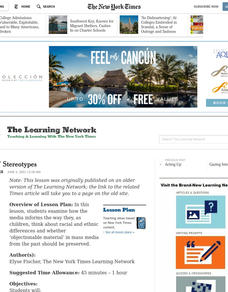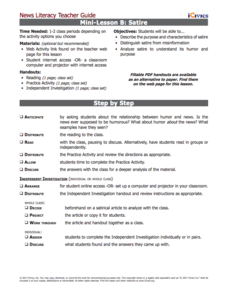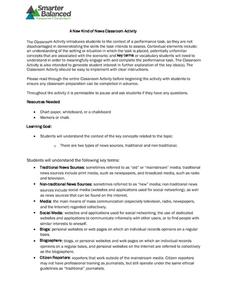Curated OER
Using Informational Books: Index, Table of Contents & Alphabetical Order
Students recall and use previous knowledge of the library's reference and nonfiction sections. Also they utilize various forms of reference (encyclopedias & dictionaries) and nonfiction books.
Curated OER
Covering the News
Students compare the coverage of two crime stories Using local or national newspapers, news magazines and other reference materials, each group trace the "unfolding" of two crime stories: The Laci Peterson investigation plus one students
Media Smarts
Teaching TV: Enjoying Television
What makes a TV program enjoyable? As an introduction to media analysis, kids identify their favorite programs and the elements they find engaging.
Curated OER
A Way with Words
How do facts and opinions impact the news? After reading "How to Cover a War" from the New York Times, middle schoolers evaluate the claims in the article. They also consider the media's responsibilities in reporting during wartime....
Curated OER
Press Review
How can word choice affect a political speech? Middle and high schoolers examine the text of the 1999 State of the Union Address, and then determine how newspaper articles and television reports describe and analyze the event. Use this...
Curated OER
Advertising and Healthy Decisions
Students analyze alcohol and tobacco ads and create parodies of them. The eight lessons in this unit include discussions about why teens smoke or drink, the psychology behind the advertising, and writing persuasive letters to agencies,...
Curated OER
Class in the Media: Writing a Television Show
Students look at popular media presentations to determine what type of messages they convey about class and class-linked behavior. They listen to contemporary music to explore how the songs touch upon social class issues. They read...
Curated OER
Media Literacy: TV - What You Don't See!
Students examine how to evaluate what they are watching on television. They discuss hip hop music videos, compare/contrast them to other types of music videos, write a letter or press release about promoting positive teen stories, and...
Curated OER
Focus on the Media
Learners critically examine news articles and editorials for attitudes of discrimination and prejudice. Students then complete checklist in which they analyze news reports for context, content, point of view, language, graphics, and...
News Literacy Project
News Judges
Order in the court! Scholars act as news judges, learning how to analyze the newsworthiness of several pieces of information. Working in small groups, they determine which events are most newsworthy and then complete graphic organizers...
News Literacy Project
Story Explorers: Evaluate News Coverage
What makes an issue or event newsworthy? Scholars complete a K-W-H-L chart based on a recent news event. As they complete the chart, small groups collaborate to analyze coverage of the story or event.
PBS
Broadcast News
Just because a story is on the news doesn't mean it's being presented fairly. Analyze news broadcasts with a lesson focused on evaluating television journalism. At home, kids watch a news show and note the stories presented, including...
Curated OER
Going Beyond the Screen
During Screen-Free Week, help your pupils develop media literacy through analysis of their favorite shows.
Curated OER
Sufferin' Stereotypes
Examine how the media informs the way your class thinks about racial and ethnic differences. Additionally, middle and high schoolers discuss whether "objectionable material" in mass media from the past should be preserved.
American Press Institute
Creating a Classroom Newspaper
Hot off the press: a mini-unit for class members to create their own newspaper. Complete with graphic organizers, extension activities, and helpful learning targets that teach parts of a newspaper, the resource contains everything needed...
Newseum
Today's Front Pages
Take a close look at a number of newspapers with collection of lessons and activities. Using a poster (which can be found under the materials tab), learners examine the hard copy of a local newspaper. This leads into an exploration of...
iCivics
Mini-Lesson B: Satire
Hey, what's so funny? Explore the use of satire in a variety of media with a hands-on instructional activity. Fourth in a five-part journalism series from iCivics, the activity introduces satirical language in print and online. Pupils...
Curated Video
Reporting - Safety and Abuse Tool
Keep your charges safe online with instruction on how to report problems on YouTube. After providing learners with information on the Safety and Abuse Tool, demonstrate how to use the tool and discuss the feature. In groups, learners...
Curated OER
The Media and You
Learners create a system to approach news articles. They analyze media content for main ideas and overall themes and summarize key points. Students draw upon personal experiences to build on ideas presented in news articles.
Curated OER
Gandhi's Alternate View of Women: Changing the Face of Modern Media & Advertising
Eleventh graders analyze the violence of media and advertising on women, as well as Gandhi's views of women. In this women and media lesson, 11th graders Killing Us Softly and Tough Guise as an analysis of media and advertising and their...
Smarter Balanced
A New Kind of News
Newspapers and broadcast news. Social media, blogs, and blogospheres. Class members generate a list of news sources they use to get information about events. The big idea here is to introduce the necessary vocabulary and to establish a...
Curated OER
Cartoons for the Classroom: The Future of Newspapers
Are newspapers dying, or fighting to survive? Give your scholars access to this controversial debate using political cartoons. In this analsyis handout, 2 cartoons display the changing role of newspapers in a world of online media....
Curated OER
Elements of Messages
Students examine media messages. In this media awareness lesson, students analyze political cartoons and identify the literary elements they incorporate. Students also use the Media Elements Handout to identify the elements in other...
Curated OER
Consider the Source
Young scholars explain how to critically compare news reporting from around the world, focusing on coverage of the Taliban regime. They compare and contrast television and print media reporting on the issue.




